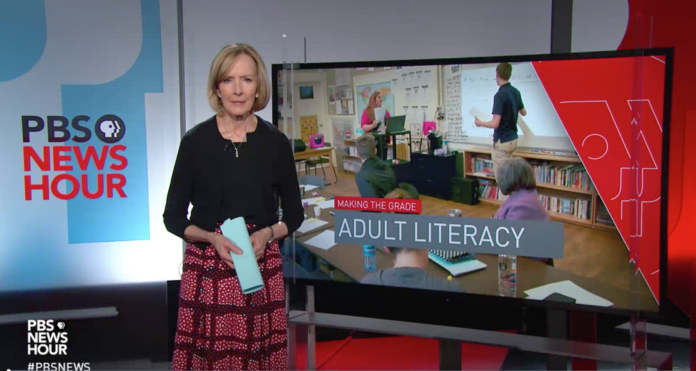By: Kavitha Cardoza
Published by PBS News Hour
Jun. 11, 2019
In the U.S., 36 million adults lack the basic literacy skills needed to sustain employment — yet education programs for this group serve only about 1.5 million, and funding continues to be cut at state and federal levels. Meanwhile, stigma can keep adults from reconnecting with the classroom. Kavitha Cardoza reports from Maine, whose governor has pledged to increase funding for adult education.
Video Link: https://www.pbs.org/newshour/show/why-36-million-american-adults-cant-read-enough-to-work-and-how-to-help-them
Video Transcript
- Judy Woodruff: Adults often go back to school to get a better-paying job. But one important and often overlooked segment of the population are those who struggle to read or do basic math. They can’t read a street sign, a pay stub or a menu.Every year, thousands of these individuals overcome shame and fear and go back to school. But inadequate funding and long waiting lists have made their struggles even harder.Maine is one of the few states where the governor has proposed increasing funding for adult education.Special correspondent Kavitha Cardoza of our partner Education Week reports on those efforts.It’s part of our regular segment, Making the Grade.
- Carol Palmer: The two-digit numbers from my — by my…
- Kavitha Cardoza: Carol Palmer is 63. She graduated high school years ago, even though she couldn’t read or write.
- Carol Palmer: I always read backwards. And I ended up going to special ed class because I couldn’t do the work, and I didn’t get no help to do it.
- Kavitha Cardoza: Palmer developed several coping skills to hide the fact she couldn’t read.
- Carol Palmer: If I went to, like, the grocery store and I couldn’t know how to spell peas, I would find a picture, and then I would know it was that.
- Kavitha Cardoza: Gail Senese heads adult education in Maine. She says a lot of people hide the fact they can’t read. They’re so ashamed.
- Gail Senese: We have had students who didn’t even want to tell a spouse for years that they were kind of faking it. No, I don’t like to read. I would rather watch television. Or you pay the bills. It’s just easier that way.It’s isolating, because you don’t want your secret to be found out.
- Kavitha Cardoza: Palmer’s at the third-grade level now, and dreams of being able to read books to her grandchildren. She’s not alone.
- Robyn Raymond: Spruce Mountain adult education has grown almost 200 percent in the last three years.
- Kavitha Cardoza: Robyn Raymond runs this program. She says the increased demand for classes is because local paper mills went to automation or moved jobs overseas. Also, there’s less demand for paper. So, positions that paid well even if you didn’t have a high school diploma vanished.
- Robyn Raymond: A month after I started, Verso paper laid off 300 workers from their mill. A year later, they ended up laying off another 200 workers.
- Kavitha Cardoza: Mill closings caused a ripple effect throughout this region.
- Robyn Raymond: It does tend to look like a ghost town. Here’s the site of the Otis mill, which has been gutted. And it’s run down, so it’s a scrapyard.
- Kavitha Cardoza: The need for adult education isn’t just concentrated in Maine, where manufacturing was the backbone of the middle class. Hundreds of adult education centers across the country help with everything from high school completion to resume writing to job training.But an area that’s often overlooked is basic reading and math.
- Sharon Bonney: Thirty-six million adults in the U.S. lack the basic literacy skills that they need.
- Kavitha Cardoza: Sharon Bonney heads the Coalition on Adult Basic Education, a national nonprofit.
- Sharon Bonney: These are folks at the lowest literacy levels. They can’t find a job. Or if they find a job, it’s at entry level, minimum wage jobs.
- Kavitha Cardoza: She says, of the 36 million, adult education programs across the country only serve 1.5 million because of funding. Federal dollars have not kept up with inflation.
- Sharon Bonney: Historically, funding has actually been about half of what it was just 15 years ago. So we are only able to serve a percentage of what we were 15 years ago.
- Kavitha Cardoza: State and local funding has also seen cuts. Bonney says some people don’t realize how big a need there is. Others feel adults have already had a chance at an education. A Trump administration proposal for next year has called for an almost 25 percent cut to state adult education programs. Advocates say that would be devastating. Some states already have long waiting lists. Some have cut back classes, and others have had to increase student fees. Many adult learners have an added challenge. They need to learn to speak English.
- Anita St. Onge: These are our graduates from last year.
- Kavitha Cardoza: Anita St. Onge is the director of Portland Adult Education, which serves 2,000 students, mostly immigrants. Some were doctors and lawyers in their home countries. Others never got a chance to go to school. St. Onge says they offer classes from 8:00 in the morning to 8:00 at night.
- Anita St. Onge: Some of our classes have 30 in a classroom, so they’re quite full. Our students have lives. They have children, they have families, they have jobs. Sometimes, they have two and three jobs.
- Class: I have a fever.
- Kavitha Cardoza: This beginning English class allows students to practice speaking.
- Divine Mushiya: I remember the challenge was, every day, we have to learn one word.
- Kavitha Cardoza: Twenty-seven-year-old Divine Mushiya is from the Democratic Republic of the Congo.
- Divine Mushiya: When I came here, all I knew to say was hi, good morning. And even when you go out and people try to talk to you, you cannot answer them, because you don’t understand what they say to you. That was really hard.
- Kavitha Cardoza: She starts work in a factory at 4:00 in the morning, so she can come to classes at night. She’s slowly getting more fluent.
- Divine Mushiya: When you learn English outside, you don’t know vocabulary. You don’t know how to use correctly the word. So coming here was really helpful for me. When my English get better, I get promotion. Yes, it’s really great.
- Class: He has a backache.
- Kavitha Cardoza: St. Onge says her students say they want to feel more integrated into the fabric of social life.
- Anita St. Onge: Once you learn English, you can participate in a much more meaningful way. You can participate in community meetings and neighborhood associations. The people who came to Portland Adult Ed 10, 15 years ago are some of the pillars in our community.
- Kavitha Cardoza: Advocates also say giving adults a second chance at an education makes economic sense, better jobs, more taxes, less reliance on social services.Adults who are poorly educated are also less likely to be involved in their child’s education, and less likely to volunteer or vote, all of which have implications for the entire country.Lisa Crawford can trace her family back five generations in Maine. She’s 45, and struggled through school before dropping out. She couldn’t fill out forms, couldn’t read road signs, couldn’t help her kids with schoolwork.
- Lisa Crawford: I felt really upset and just kind of stuck in the box of not having that education that I wanted. I felt worthless.
- Kavitha Cardoza: Three years ago, she enrolled in adult education classes and received her high school diploma. Now she’s a school custodian, a job she wouldn’t have qualified for in the past because she needs to be able to read and write every day.
- Lisa Crawford: You have to know everything that’s labeled because of — some chemicals can be really harmful. Some, you can’t mix together.
- Kavitha Cardoza: Crawford orders cleaning supplies, reads machinery manuals, and fills out accident reports. She says her life now is a dream come true, a stable job with benefits.
- Lisa Crawford: If I didn’t have that, I wouldn’t have my smile today, and it — always smiling. And I can’t stop, even if I cry.(LAUGHTER)My life back then, I was an ostrich in the ground. And my life now, I am bloom and blooming.(LAUGHTER)
- Kavitha Cardoza: For the “PBS NewsHour” and Education Week, I’m Kavitha Cardoza in Portland, Maine.
Source: https://www.pbs.org/newshour/show/why-36-million-american-adults-cant-read-enough-to-work-and-how-to-help-them
Comment: This video and transcript offers a perspective on adults developing literacy skills and specifically focuses on adult education centers. We see stories of a few people involved in participating in these centers and that it is not just about learning to read but also for some learning to speak English. This video gives a pretty comprehensive overview to adult education centers and how the issue of learning to read is often overlooked even though many need this help. It also shows what people struggle with and how there is a social impact for individuals when they don’t know how to read or speak English. It also brings awareness of lack of funding for these centers and potential positive and negative policy changes that are on the horizon.




